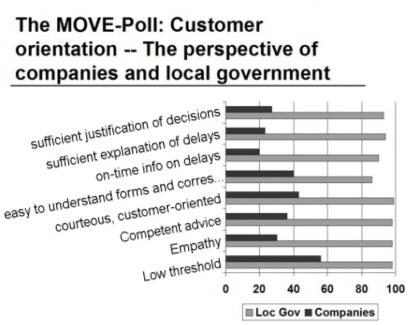Making government more responsive to businesses' needs: The example of NRW's MOVE initiative
In 2000, the government of the German state of Northrhine-Westphalia (NRW) launched an initiative to promote the SME sector (Mittelstandsoffensive, MOVE). MOVE involves a variety of activities. One of them is an effort to simplify and streamline the interaction between government, in particular local government, and SMEs. This effort started with a poll to assess the interaction between government and businesses. The result was straightforward: Whereas government agencies were convinced of being quite efficient in dealing with businesses, the businesses themselves were much less convinced. The following figure summarizes the findings.

The second step was a more systematic investigation of the interaction between government and business.
Here, you find the download of the questionnaire used in this investigation (pdf-file, 175KB, 21pp, German) and the results (pdf-file, 1,91MB, 46pp, German).The third step is the execution one pilot project in twelve municipalities. Each municipality formulates a pilot project, and as state government accepts it, some financial support is provided. Pilot projects involve activities as simple as a unified signalling system for business estates and as difficult as the creation of a one-stop-agency for dealing with government agencies in one of the largest cities of the state.

last chapter: one-stop-shops and first-stop-shops
back to: new organizational arrangements in local/regional economic
and employment promotion
More of...
governance